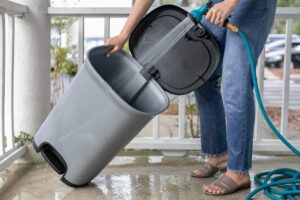Provide hot water for cooking, cleaning, and showers, water heaters are necessary for everyday comfort. On the other hand, if it is not properly maintained, this useful appliance could become a real risk. An uncommon but devastating occurrence that can endanger lives and seriously damage your house is a water heater explosion. Luckily, routine maintenance may avert these mishaps and guarantee the safe and effective operation of your water heater.
Why Water Heaters Explode?
Knowing the underlying causes is crucial to comprehending how maintenance can stop a water heater from blowing up. Water heater explodes primarily due to malfunctioning parts and high pressure.
- Excessive Pressure: To control the accumulation of pressure, water heaters are fitted with a temperature and pressure release valve or T&P valve. The pressure inside the tank rises as a result of the expansion of heated water. A water heater explosion may result from over-pressurization if this pressure isn’t appropriately discharged. One of the usual culprits is an overheated environment or a broken T&P valve.
- Faulty Thermostat: Overheating of water heaters increases internal pressure and temperature due to a defective thermostat; overheating could put undue stress on the tank as a whole and possibly result in its explosion, should that thermostat fail.
- Sediment Buildup: Minerals in water accumulate at the bottom of the tank over time, creating sediment layers known as sediment buildup. Overwork and overheating may arise from this accumulation in the water heater. Sediment can also tamper with temperature controls, creating hazardous conditions inside the bladder.
The Role Of Regular Maintenance
Prior to these problems becoming major hazards, they can be resolved with routine maintenance. The chance of an explosion can be greatly decreased and the lifespan of your water heater can be increased by arranging for yearly maintenance.
- Flushing The Tank
Every year, one of the easiest but most crucial maintenance chores is to flush the water heater. Sediment accumulation is removed from the tank by a licensed plumber during this procedure. By doing this, sediment interference helps keep the tank from overheating. Should this process not be followed, sedimentation could isolate the water from the heat source, leading to excessive heating and possible failure of the heater.
- Checking The T&P Valve
Temperature and pressure release valves play an integral part in keeping water heaters operating safely, with regular inspection by plumbers for optimal operation. Leaks, brokenness or obstruction must be resolved promptly since defective T&P valves pose the threat of explosion by building pressure inside the tank resulting in unsafe pressure build-up that increases risk.
- Inspecting The Thermostat
Maintaining the water heater’s temperature at a safe level requires a functioning thermostat. A thermostat inspection and, if required, calibration will take place during maintenance. In order to avoid overheating and pressure building, the thermostat can be fixed or changed if it is broken. This keeps the safe temperature limitations for your water heater from being exceeded.
- Checking For Corrosion And Leaks
When water heaters get older, corrosion poses a serious risk to them. A water heater that is under pressure may burst if corrosion damages the tank’s integrity. A plumber performing maintenance will look for corrosion and leaks in the tank and its parts. A water heater’s lifespan can be increased and hazardous conditions can be avoided if corrosion is found early and treated with repairs.
Benefits Of Professional Water Heater Maintenance
The safety of your water heater depends on professional inspections, even if some homeowners might try to handle simple maintenance on their own. An amateur chick may miss any risks that a licensed plumber can identify with their knowledge and equipment.
You can also save money by avoiding expensive repairs or replacements through routine expert maintenance. Your energy costs will go down if you keep your water heater in top shape because well-maintained water heaters use less electricity.
Final Thoughts
Though it’s a terrifying situation, most water heater explosions may be avoided with routine maintenance. You and your loved ones can be spared this disastrous occurrence by taking care of typical problems including high pressure, malfunctioning parts, and sediment buildup. To ensure that your water heater runs safely and effectively and gives you piece of mind for years to come, an expert plumber should test it annually.










+ There are no comments
Add yours